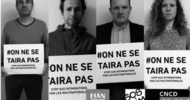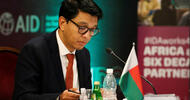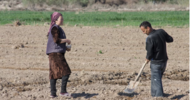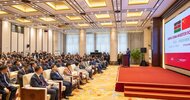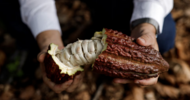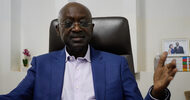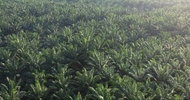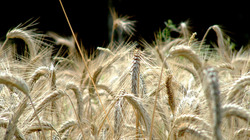
Kanayo Nwenze, the head of IFAD, insists that Africans should resist the temptation to sell land and instead take advantage of the continent's agriculture potential to grow food and high value crops that the rest of the world is ready to purchase.
Wheat Is the Real Deal for Rwandan Farmers - Experts
By Kenneth Agutamba,
Why are foreign investors interested in land in Africa? Dr. Kanayo Nwanze, the president of the International Fund for Agriculture Development (IFAD), posed that question during the 6th Africa Agricultural Science Week in Accra last week.
Dr. Nwanze claims it is because Africans own the largest share of arable land in the world to date. That means that Africans own the single most important resource needed to produce food required to feed the growing population of hungry people in the world. Food production is seen by some investors as the most lucrative business today and in the years to come.
Yet somehow, the continent with the largest share of fertile land is also home to the biggest number of hungry people and malnourished children.
Where then, is the problem?
Agriculture, despite being a livelihood to the vast majority of people, continues to attract the least funding in national budgets. As a result, technological advances lag behind in African agriculture, and the sector's potential remains unmet.
So Africans, despite owning big chunks of arable land, are either turning into net importers of food or living on food aid from industrialized countries. The smallholder farmers, cultivating small pieces of land, cannot produce for market demands. Yet, according to IFAD, the real problem is that, across the continent, Africans are selling chunks of land to investors from developed countries.
Nwenze insists that Africans should resist the temptation to sell land and instead take advantage of the continent's agriculture potential to grow food and high value crops that the rest of the world is ready to purchase. "Take advantage of opportunities and do not sell land blindly... development is not something we do for others but for ourselves," he said.
Benefits:
Endowed with good soil and climate, East Africa can reap from increased agricultural production. Apart from ensuring food security, increased agriculture will reduce food prices and inflation and will increase economic development.
According to the International Maize and Wheat Improvement Centre, the Common Market for Eastern and Southern Africa (COMESA) member countries should consider wheat a strategic crop from which to earn foreign exchange, improve food security, keep inflation under check and indeed provide employment.
Figures show that the demand for wheat even within African countries is growing - making it one of the most strategic crops for investors seeking to buy land in Africa to invest in. Individual African countries, including Rwanda, spend millions of dollars each year to import wheat - and in effect, help finance farmers from wheat producing countries.
So lucrative is the wheat business wheat that the Minister of Finance and Economic Planning negotiated for a common external tariff of 30% on imported wheat flour, down from 60% in this year's budget. Within the continent, the market for wheat is big. African producers produce about 23 million tons of wheat, yet the continent consumes 53 million tons annually, according to world trade figures. That means that the continent imports 36 million tons of wheat per year.
There is therefore need for COMESA, the biggest economic bloc in Africa, to view wheat as a strategic crop that could form the basis for commercializing agriculture. Victor Kommerell of the International Maize and Wheat Improvement Centre had the same message during a conference in Ghana last week. "We propose that COMESA consider wheat as a strategic commodity in the regional investment plan. This is what donors want to see," he said.
With relatively high altitude and well-distributed rainfall, Rwanda has ideal conditions for wheat production. It is time we start taking advantage of it.




